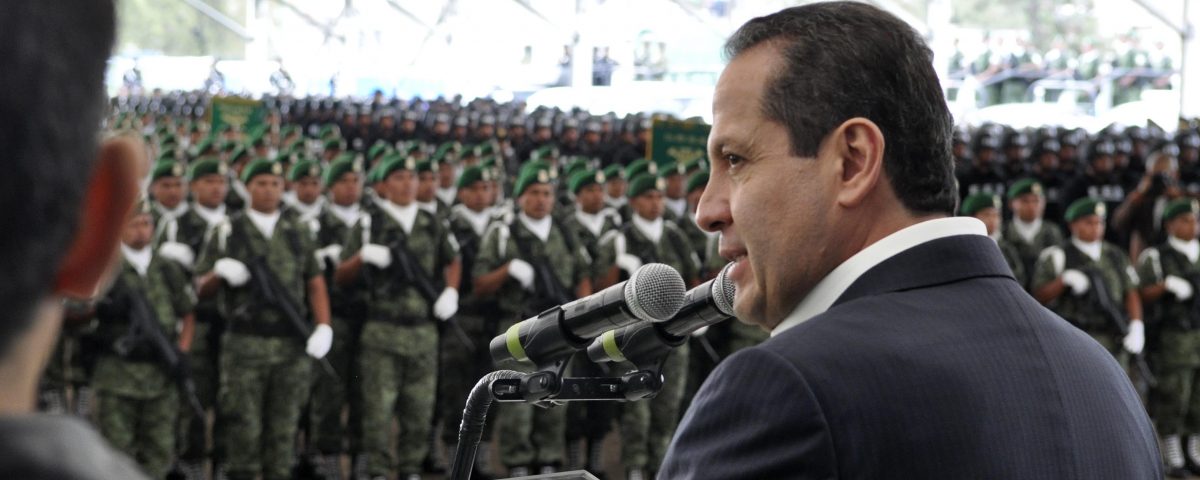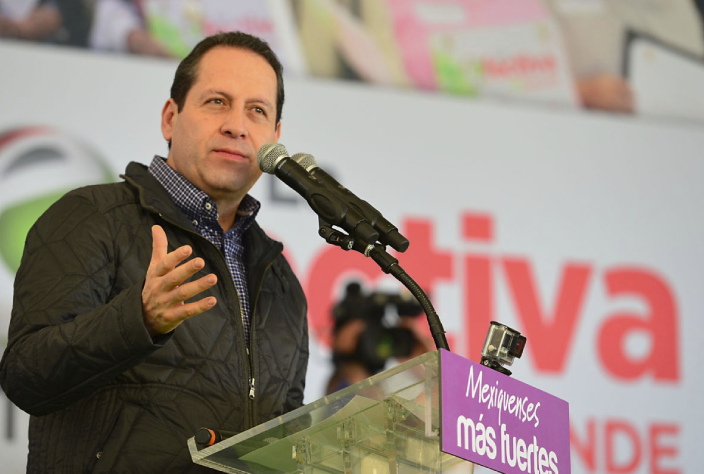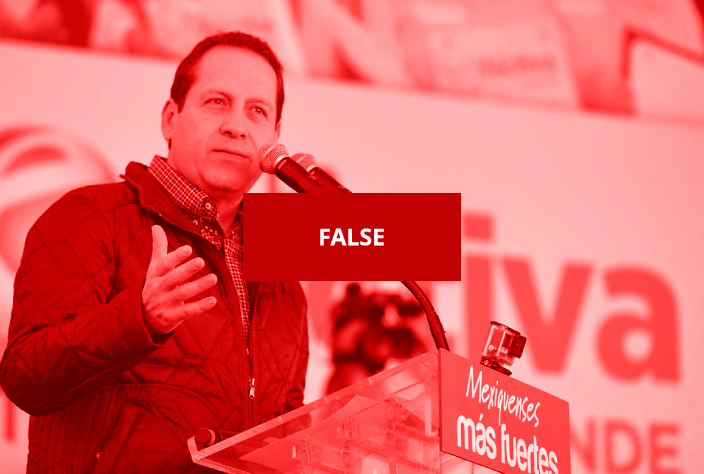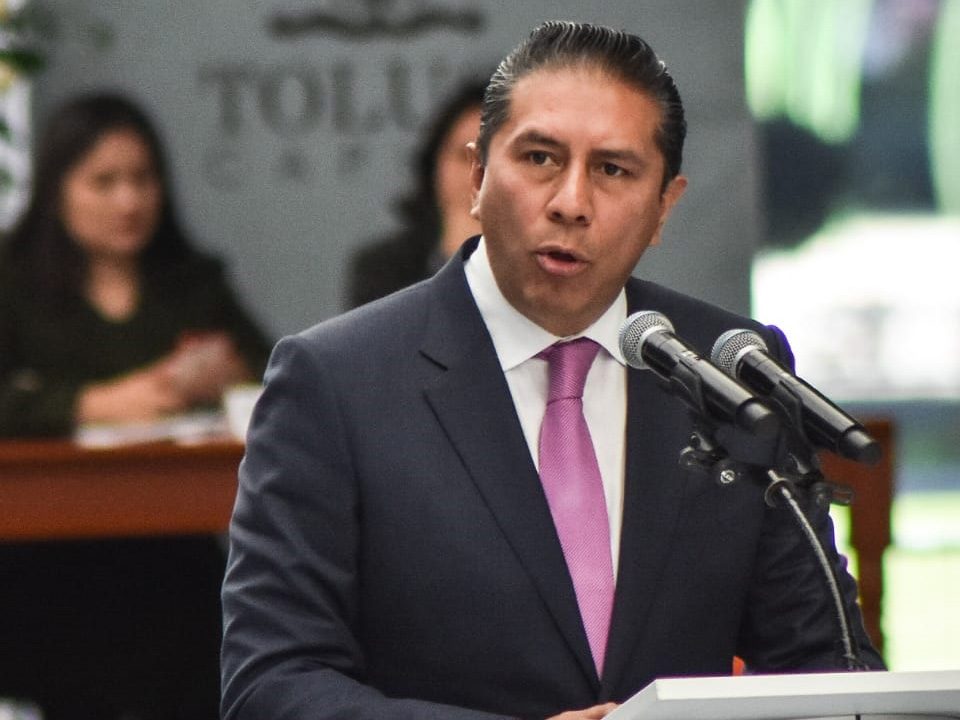
“THE DEAD OF ERUVIEL” IN ECATEPEC, CITY OF CRIME
July 25, 2017
There are “around 20,000 state police officers” according to Del Mazo, here we verify it
September 27, 2017Law Atenco, Recommendation of IACHR: EAV

Eruviel´s Atenco Law for alleged Human Rights recomendation is false


THE DATA:
On March 19th 2016, Eruviel Avila (the State of Mexico’s governor) assured that the Inter-American Commission on Human Rights (IACHR) had sent him an “Advice” on their report 243, published in March 2015 to norm the use of police force, justifying in this way the Law which Regulates the Police Force in the State of Mexico, of which coming into force is suspended because it is still being studied by the Supreme Court of Justice of the Nation after the increasing of impugnments that were followed after its approval on March 17th of the last year.
At that moment the governor said it as it follows: “This law responds to an advice given by the Inter-American Commission on Human Rights, issued through the report 243, published in March of 2015 to regulate the use of police forces under the principles of legality, absolute need and proportionality”.
ANALYSIS:
However, a detailed study of the case allowed to establish that this was nothing more than an “official lie” in three tracks, in which the governor, Eruviel Ávila, participated as well as María Paz Zarza, the legal adviser of the state’s government; and the general secretary of government, José Manzur, who in separated speeches said the same deceit.
After analyzing the quoted sources by the three functionaries, it was confirmed that the IACHR did not send any literal recommendation or advice to the state’s government to enact the Law which Regulates the Police Force in the State of Mexico (also known as Atenco Law), any time that the supposed “advice 243” which they quote to justify the order, never existed, and, in any case it was a “Background Resolution” directed to the government of Ecuador.
Such resolution, released in February of 2015 and not in March, asks to the government of that country for norms to “regulate the police forces”, like that in a direct way and to avoid any excess against the population. This derived from a specific case of police abuse which ended up in the death of a person and with a sentence against the State of Ecuador.
A review of the Background Resolutions (as the sentences dictated by the IACHR are called and not “recommendations” as the governor called them), Friendly Solutions, Audiences and Cases sent to the Court in 2015, diffused on the official site of the organization, gives a proof that there was not a single resolution sent to the government of the State of Mexico in that sense, even though there actually is a general recommendation in the annual report of the IACHR (published in December of 2015) about the “Situation of the Human Rights in Mexico”, which, in its 7th chapter, asks in any case for a gradual withdrawal of the Armed Forces in public security matters to be taken again by the civil police”. This was in December, not in March of 2015.
The expert and lawyer, José Antonio Lara Duque, from the “Center of Human Rights Zeferino Ladrillero”, was asked about it, confirmed the results of this searching when he realized that it never existed such a Recommendation to the state’s government in 2015 to start with the so called “Atenco Law” (or “Eruviel Law”), but they are “taking it” from issues related to Ecuador and Peru, he pointed out.
Such issues are referred to “forced disappearances” in those Central American countries, therefore, he said, “the statements of the functionaries as well as the ones of María Paz Zarza (the legal adviser) are completely out of context”.
He sustained that the organization issued a resolution (the 11.458) but for the governments of Ecuador and Peru in a similar sense, but never for the Mexican state.
In a few words and just as the way that Yurixi Leyva Piñón (general secretary of the PRD) pointed it out: María Paz Zarza lied, the specialist said.
He also questioned the possibility that Paz Zarza had received the endorsement of a UN’s senior official since it is about strict organizations with regulated communication mechanisms.
“International organizations have very rigorous procedures to be able to give any positioning in formal terms, it must go through a whole inner study in the institutions, I would not have less to say than it is irresponsible she manage it that way, because categorically it is fake that the UN and the IACHR are giving their approval to a law which violates the Human Rights such as the Eruviel Law… what we categorically say is that there’s no endorsement from any international organization to the Eruviel Law”, he ended.
He pointed that if the resolutions of the Court and the IACHR are binding to the governments, it is also true that absolutely nothing was recommended in particular to the government of Eruviel Ávila.
WHAT THE ANNUAL REPORT SAYS.
It is worth to mention that through a mess of numbers, it is possible that the legal adviser had referred to the chapter 7’s point “234” of the “Annual Report on the Situation of Human Rights in Mexico”, in which the organization emitted last December on a point referred to the massacre in Tanahuato, Michoacán, a record to regulate the performance of the police force in that location after the slaughter of May, 2015, where 42 people died.
Page 116 of the report points, on its section 233, literally: The IACHR reminds to the Mexican Government that the standards of the inter-American system have established that with the aim of observing the measures of performance in cases that might result imperative the use of strength, this must be done according to the principles of legality, absolute need and proportion. In every single case where civilians end up injured or dead in the hands of military or police forces, and in pursuance of the international obligations, the Mexican government must make diligent and unbiased investigation urgently with the aim of set the facts and determine criminal responsibilities. For the sake of transparency a call is made so the State retake the statistics on the number of dead civilians over every injured civilian.
Likewise, section 234 establishes: the IACHR urges the Mexican State to set the necessary actions to guarantee that all the police authorities and the forces of order will be subject to effective systems of reporting back, including internal and external schemes of supervision.
On the other side, what the organization did emit in last March was the official report related to its 154th period of sessions, celebrated in March, 2015 in Washington DC, in which it is established a short section named “Social Protest and Human Rights in America”, where it is reported “a worrying tendency to criminalize the social protest through the expedition of similar ordinances to the also so called “Eruviel Law”, today under the scope of the National Supreme Court of Justice.
Such report, published by the end of March in 2015 (a week after the audiences were finished), exposes clearly the phenomenon of the social protest criminalization: “30 organizations of the area’s civil society showed information to the IACHR about a worrying tendency to criminalize and violent repression of those who practice the right to make a social protest in America… information was received about the authorization given by some governments to the army to “act” during protests when it is a non-trained force to act on public spots. The IACHR received with concern information about the use of figures such as public order’s disturbance, illicit association, cut routes, usurpation, disrespect, among others as intimidation tools”, the report indicates.
It also points: “In such sense, they added that would exist legal initiatives which look for, regulate, restrict and/or make invisible in an improperly way the exercise of the protest or that endorse their violent repression. They reported, such initiatives include unacceptable requirements as the previous authorization, the duty of non-stop or in the use of technological ways to block communications”.
BUT WHAT DOES THE “ATENCO LAW” SAY?
The quoted law, approved by majority vote, establishes that “a convention or meeting will be illegal when the people handle guns or if the petition or protest is made with threats to intimidate or force the authorities to solve it in certain way”.
The 12th article forbids the pacific resistance and strikes against the liberty of manifestation. Literally, such article indicates that it is a duty of the elements from the security institutions to make use of force in the “passive resistance: when people do not obey legitimate orders given in a direct way by the element who previously had identified himself and not make actions that hurt himself, a third person or the element”.
The 8th article indicates that the authority will be able to make use of lethal weapons only in “exceptional, strictly necessary and inevitable cases”, also with the aim of protecting people’s lives and elements’ as well.
It is also established that the use of force in assemblies, manifestations, violent or illegal meetings, it will be decided by the person in charge of the operation, with which, Morena warned, there is the pretension that senior officials and the governor himself do not have any responsibility.
The 24th article allows the use of force against people in manifestations; the 15th threats the freedom of speech, since the police grades if an assembly is legal; the 16th breaks the principle of lead unity; the 17th allows spying and there isn’t any punishment to those who incurring in abuses.
Rank:
After the study made by “The Observer” and matching with several sources, the conclusion is that the statements made by the governor of the State of Mexico, Eruviel Ávila Villegas on March 19th of 2016 are LIES.
By: María Teresa Montaño







1 Comment
I always have a problem with people who claim that the math of kin selection rules out possibilities like ethnic nepotism. They seem to believe that the rules of kin selection, e.g., I’ll die for two children, or 4 cousins, etc. somehow can be exactly reflected in the brain structures and processes of people (or other organisms) so that we only make sacrifices in precisely the cases in which the math works out.
replica love bangle gold http://www.thelovejewelry.net/